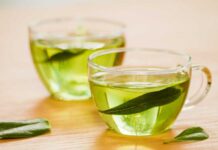
Everyone’s heartburn triggers are different, but there are some common culprits.
Heartburn, a common symptom of acid reflux, causes generally the same symptoms in everyone — a burning sensation in the chest caused by stomach acid working its way up the esophagus — but what causes the condition in one person may be completely different than what causes it in another.
“Heartburn can be very individualized,” says Julia Zumpano, RD, a registered dietitian at the Cleveland Clinic Digestive Disease Institute in Ohio.
Heartburn doesn’t always happen immediately after meals, she adds. “Usually heartburn happens right after eating, but some people have slow gastric emptying, so they may experience the effects a couple hours later,” she says.
Heartburn in general is caused by the relaxing of the sphincter muscle that separates the esophagus and the stomach. When that muscle becomes loose or relaxed, it lets acid come up from the stomach and into the esophagus, causing heartburn.
“There are things that we eat or do that cause that lower muscle to relax more frequently and that increases the risk of reflux,” says Christopher Marshall, MD, clinical chief of gastroenterology at UMass Memorial Health in Worcester, Massachusetts.
Although every person is different, there are some rules of thumb as far as what you can do, and what you should avoid, to try to keep heartburn at bay.
Do Avoid Fatty Foods
Dr. Marshall says one of the most effective things people can do to avoid heartburn is to avoid eating fatty meals. This includes the typical culprits like fried food, but also fatty meats.
This is because fat is one thing that can cause the sphincter to relax and let acid through, Marshall says.
“Eating a low-fat, heart healthy diet is going to benefit everyone in all aspects of your life,” he says. “It’s going to help manage weight, which is a trigger for heartburn and reflux, but also help avoid fat as a trigger itself.”
Don’t Lay Down Right After Eating
No matter what you eat, laying down before your stomach has a chance to digest your meal is a common trigger for heartburn, Marshall says. Sitting is just fine, but going horizontal makes it easier for stomach acid to get into the esophagus, since gravity is no longer on your side, keeping it down. This also means eating your last meal of the day at least two to three hours before bed is best, Marshall says, adding that some people may also benefit from elevating their head and chest when they sleep.
A study of 2,000 people living in Pakistan, published in the Pakistan Journal of Medical Sciences, showed that elevating the head and chest during sleep was the most important lifestyle change people could do to relieve reflux.
Do Avoid Alcohol and Cigarettes
Alcohol and cigarettes, including e-cigarettes, are both known to relax the esophageal sphincter, letting stomach acid through, says Marshall.
A meta-analysis published in the journal Alcohol and Alcoholism included 28 studies on alcohol and acid reflux. The researchers concluded that while drinking any amount of alcohol did have the potential to increase reflux, drinking more at a time, and more frequently, was strongly associated with worse symptoms of gastroesophageal reflux disease (GERD), a symptom of which is chronic heartburn.
Don’t Go Too Spicy
Heavy spice levels are common in many cuisines, but spicy foods are also a notorious trigger for heartburn.
A survey study published in Digestive Diseases and Sciences included 100 patients who had GERD. Of these, 85 patients were able to identify at least one food that triggered their symptoms. The most common trigger was spicy foods, which caused heartburn in 62 percent of people in the trial.
If spicy foods are a trigger for you, Zumpano’s advice is to add flavor with less irritating herbs like oregano or turmeric when you can.
Do Avoid Acidic Foods and Drinks
Acidic foods and drinks irritate the lining of the esophagus and can make it more inflamed.
But again, which acidic foods and beverages trigger heartburn, and how big of an effect they have, depends on the person.
Coffee is an acidic drink that often makes lists of foods to avoid if you have heartburn, but the research on this is mixed. One meta-analysis, published in the journal Nutrients, showed that while one small study of 31 people found coffee to relax the lower esophageal sphincter and increase reflux, though it varied between types of coffee. The analysis included 30 studies overall and found no conclusive evidence that coffee is linked to higher occurrences of GERD.
“Citrus in general can also trigger heartburn, but it’s so individualized,” Zumpano says, adding that people should pay close attention to what seems to trigger their individual heartburn.
Don’t Over Eat
Eating too much during a meal has also been identified as a common trigger for heartburn.
A meta-analysis of six studies that included more than 34,000 people, published in the journal Therapeutics and Clinical Risk Management, found that snacking at night and overeating were both associated with higher risk of heartburn.
If overeating is a trigger, Zumpano suggests people stop eating before they feel full to keep from eating too much and causing a bout of heartburn. “Practice eating more frequent meals high in protein and fiber. Use smaller plates and bowls, and eat with your nondominant hand to slow you down,” she adds.
Do Find Out What Your Triggers Are
Zumpano recommends keeping a food journal to help identify your individual triggers.
“Jot down every time you get heartburn, the severity, and what you had to eat,” Zumpano says. “If you write it down when it happens you can pinpoint what in that meal triggered it.”
While peppermint is a common heartburn trigger, it may help treat other digestive disorders like IBS, Marshall says. In the study published in Digestive Diseases and Sciences, 85 people with GERD were able to reduce heartburn by 50 percent through identifying their food triggers and avoiding them. The most common triggers reported were spicy foods, chocolate, pizza, tomato, and fried foods.
“The biggest take-home message is recognizing what your personal triggers are so you can find the best relief,” Zumpano says.
Editorial Sources and Fact-Checking
- Nehling A et al. Effects of Coffee on the Gastro-Intestinal Tract: A Narrative Review and Literature Update. Nutrients. January 17, 2022.
- Zhang M et al. Dietary and Lifestyle Factors Related to Gastroesophageal Reflux Disease: A Systematic Review. Therapeutics and Clinical Risk Management. April 15, 2021.
- Tosetti C et al. Elimination of Dietary Triggers Is Successful in Treating Symptoms of Gastroesophageal Reflux Disease. Digestive Diseases and Sciences. June 24, 2020.
- Ahmed S et al. Effects of Lifestyle Factors on the Symptoms of Gastro Esophageal Reflux Disease: A Cross Sectional Study in a Pakistani Population. Pakistan Journal of Medical Sciences. January 2020.
- Pan J et al. Alcohol Consumption and the Risk of Gastroesophageal Reflux Disease: A Systematic Review and Meta-Analysis. Alcohol and Alcoholism. September 4, 2018.
Important Notice: This article was originally published at www.everydayhealth.com by Kaitlin Sullivan where all credits are due. Medically reviewed by Ira Daniel Breite, MD.
Disclaimer
The watching, interacting, and participation of any kind with anything on this page does not constitute or initiate a doctor-patient relationship with Dr. Farrah™. None of the statements here have been evaluated by the Food and Drug Administration (FDA). The products of Dr. Farrah™ are not intended to diagnose, treat, cure, or prevent any disease. The information being provided should only be considered for education and entertainment purposes only. If you feel that anything you see or hear may be of value to you on this page or on any other medium of any kind associated with, showing, or quoting anything relating to Dr. Farrah™ in any way at any time, you are encouraged to and agree to consult with a licensed healthcare professional in your area to discuss it. If you feel that you’re having a healthcare emergency, seek medical attention immediately. The views expressed here are simply either the views and opinions of Dr. Farrah™ or others appearing and are protected under the first amendment.
Dr. Farrah™ is a highly experienced Licensed Medical Doctor certified in evidence-based clinical nutrition, not some enthusiast, formulator, or medium promoting the wild and unrestrained use of nutrition products for health issues without clinical experience and scientific evidence of therapeutic benefit. Dr. Farrah™ has personally and keenly studied everything she recommends, and more importantly, she’s closely observed the reactions and results in a clinical setting countless times over the course of her career involving the treatment of over 150,000 patients.
Dr. Farrah™ promotes evidence-based natural approaches to health, which means integrating her individual scientific and clinical expertise with the best available external clinical evidence from systematic research. By individual clinical expertise, I refer to the proficiency and judgment that individual clinicians acquire through clinical experience and clinical practice.
Dr. Farrah™ does not make any representation or warranties with respect to the accuracy, applicability, fitness, or completeness of any multimedia content provided. Dr. Farrah™ does not warrant the performance, effectiveness, or applicability of any sites listed, linked, or referenced to, in, or by any multimedia content.
To be clear, the multimedia content is not intended to be a substitute for professional medical advice, diagnosis, or treatment. Always seek the advice of your physician or other qualified health providers with any questions you may have regarding a medical condition. Never disregard professional medical advice or delay in seeking it because of something you have read or seen in any website, video, image, or media of any kind. Dr. Farrah™ hereby disclaims any and all liability to any party for any direct, indirect, implied, punitive, special, incidental, or other consequential damages arising directly or indirectly from any use of the content, which is provided as is, and without warranties.








